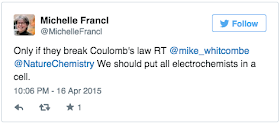 |
| STO-3G//STO-3G calculated Raman spectrum of arsole |
 |
| Is RT retweet or 2.5 kJ/mol? |
This piece was pure fun to write. I enjoyed crowdsourcing examples of chemical double meanings. (List of 200 examples is here.) By far the favorite mechanism of formation for chemists is polysemy, where words share a common ancestor, but the meanings have drifted apart. Take flush, as in flush a column, or flush a toilet or flush game or even a straight flush. All these senses derive from the Latin fluxus for flow. (Don't see the connection to poker? The OED suggests you think of a flush as a "run" or flow of cards.)
Sometimes the two meanings sit close to the surface for chemists, other times we are pretty blind to the lexical ambiguity. My youngest son is toying with the idea of a chemistry major, and when I read him examples from the list, he was quick to note both senses for many words: cell, salt, aromatic. But when I got to molar, he wanted to know what else it meant beyond the concentration of a solution. "Teeth?" I suggested. He face palmed. Whether he majors in chemistry or not, we've already messed with his mind.
Polysemy is productive — as the linguists would say — not just in terms of the language, but of new chemistry. We ought not to discourage lexical play in chemists (not that one has much control over language in any case, IUPAC's gold book notwithstanding) it gives us a rich set of images to draw on and as I said in the essay, "we can't look for what our language doesn't let us imagine."
Read the essay here. ($)
No comments:
Post a Comment
Markup Key:
- <b>bold</b> = bold
- <i>italic</i> = italic
- <a href="http://www.fieldofscience.com/">FoS</a> = FoS